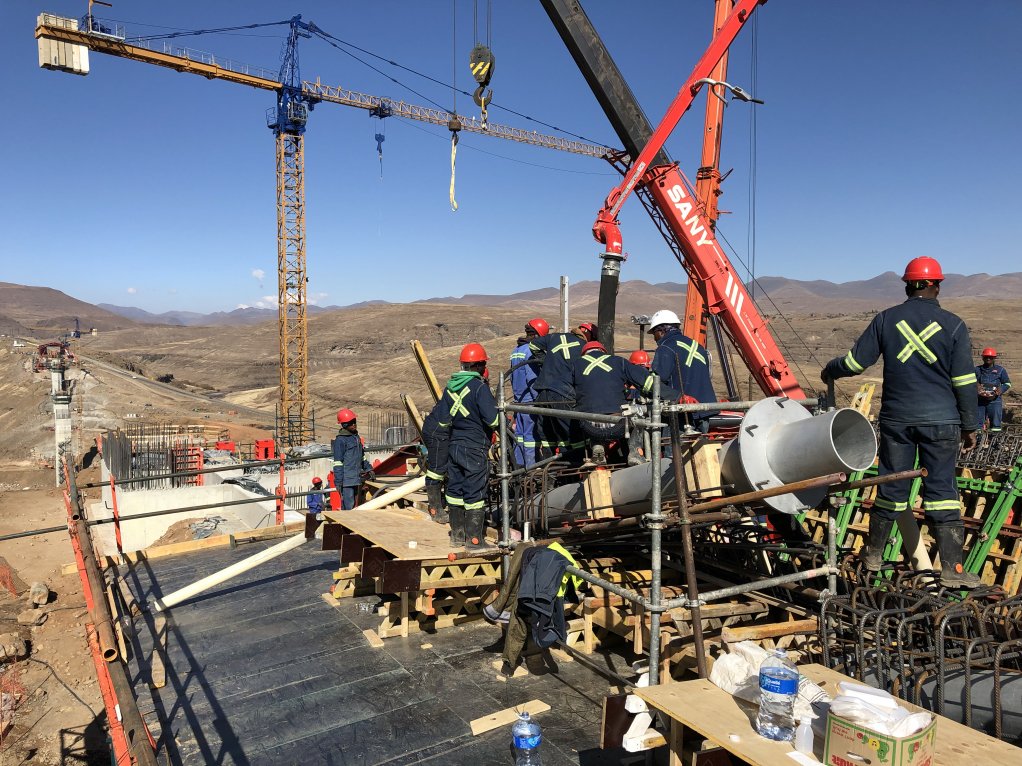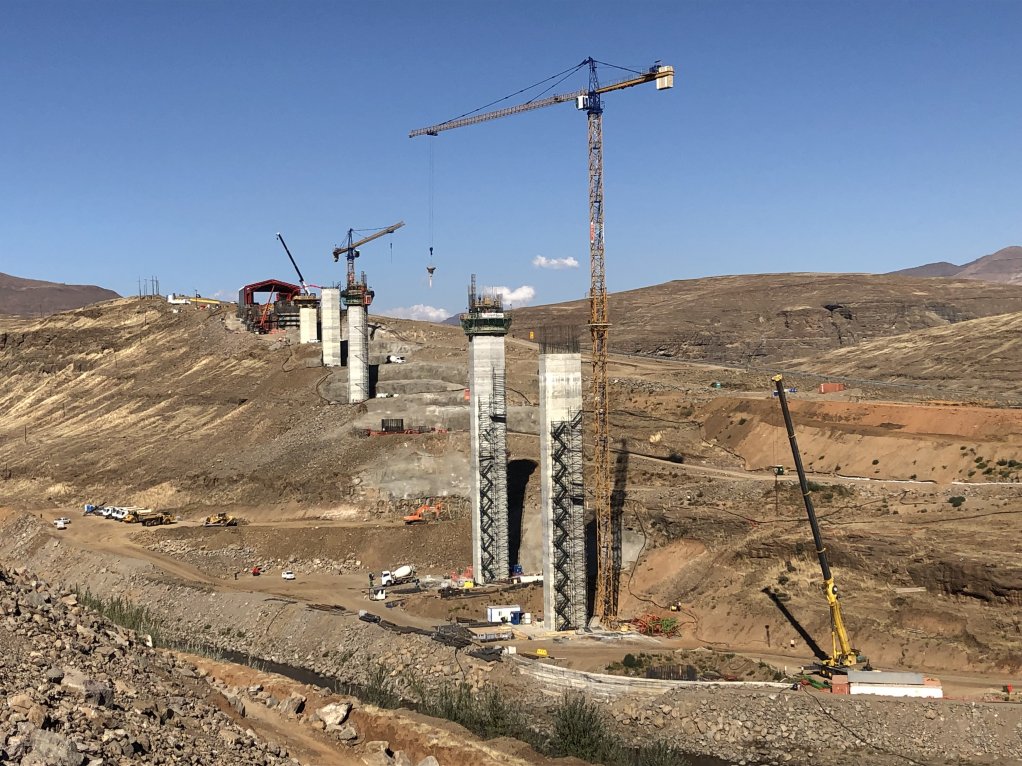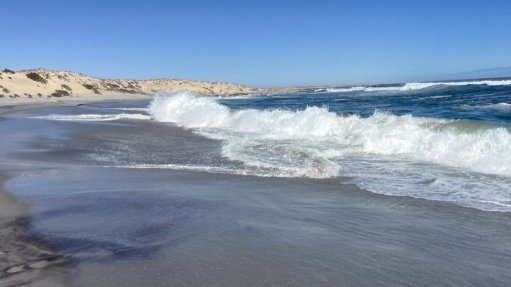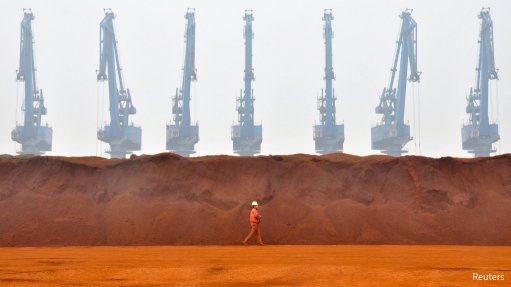LHWP II’s Senqu Bridge progressing steadily



SIGNIFICANT MILESTONE A significant milestone was reached in May when the first deck segment was cast on the Northern abutment
SIMULTANEOUS WORK On the southern bank Piers 11 and 14 columns are currently being constructed simultaneously
The Lesotho Highlands Water Project (LHWP) Phase II passed a significant milestone in May, following the casting of the first deck segment on the northern abutment of the Senqu bridge.
Work on the 825-m-long, 90-m-high Senqu bridge, the largest of the three major bridges under construction to span the Polihali reservoir, started in 2018, with the bridge design led by Zutari, formerly Aurecon Lesotho.
Following this development, the Lesotho Highlands Development Authority (LHDA) awarded the three-year, M2-billion Senqu bridge construction contract to the multinational WRES Senqu Bridge Joint Venture (JV) in August 2022.
The WRES JV includes Italy-based Webuild; South African firms Raubex Construction and Enza Construction; and Lesotho-based Sigma Construction, with subcontractors including South African firms EXR Construction and Post Tensioning and Structural Solutions; Austria’s Gleitbau-Geselschaft; and France-based Freyssinet International et Cie.
The Senqu bridge, which is also bigger than the Mphorosane bridge on the ‘Malibamats’o river which spans the Katse dam constructed in Phase I of the LHWP, is expected to be completed in early 2026.
Owing to the deep valley and the terrain of the area, the deck is being constructed incrementally from both abutments, which will minimise the disturbance to the surrounding work area and increase workers’ safety.
“An in-situ segment midspan of the centre span will connect the two parts to form a continuous deck. The deck shape is ideal to be constructed with sliding formwork,” the authority says, adding that the deck segments are reinforced and cast in 25 m sections using shutter moulds located in the fixing and casting yard on either abutment.
“Once cured, the section is hydraulically jacked out over the gorge along the tops of the piers and then the process is repeated.”
The retractable roof on the temporary fixing shed will allow more consistent curing temperatures, better working conditions through the long, harsh winter and as noise abatement for the adjacent community when working night shifts.
LHDA highlights the significant milestone achieved on May 24, when the first deck segment was cast on the northern abutment.
The leading cable tube will house the cables for the 50-m-long middle section, supported by a small cable stay system, which allows the bridge to span 100 m directly over the Senqu river and avoids difficulties of having to build a pier mid-stream on what can sometimes be a ranging torrent.
On the southern bank Piers 11 and 14, columns are currently being constructed simultaneously, with teams working 24 hours a day, 7 days a week to complete them in a continuous slide.
The Senqu bridge design has taken into consideration the long, cold and harsh winter conditions experienced in the Mokhotlong highlands.
“Overnight temperatures in May in the Lesotho Highlands regularly drop to the lower single figures and only reach the low- to mid-twenties during the day. This slows concreted curing time and has reduced the rate at which the piers can be slid from the 3.5 m to 4.0 m a day achieved in summer to 2.0 m to 2.5 m a day currently.”
The slide of pier 10 will resume following the completion of piers 11 and 9.
The Sengu bridge is one of the three bridges being built along the Maseru to Mokhotlong A1 road at the Mabunyane, Khubelu and Senqu rivers to ensure access across the reservoir and connectivity to the national road network.
This will enable access to Mokhotlong town across the reservoir even at full supply and retain connectivity to the national road network along the A1, the main road between the Mokhotlong district in the mountainous north-east of the country and Maseru, Lesotho’s capital city.
The major bridges programme is complemented by the construction of four pedestrian bridges and six vehicle bridges under the feeder roads and bridges programme to maintain connectivity and ensure mobility for communities in the reservoir area.
This programme is currently under procurement.
Article Enquiry
Email Article
Save Article
Feedback
To advertise email advertising@creamermedia.co.za or click here
Announcements
What's On
Subscribe to improve your user experience...
Option 1 (equivalent of R125 a month):
Receive a weekly copy of Creamer Media's Engineering News & Mining Weekly magazine
(print copy for those in South Africa and e-magazine for those outside of South Africa)
Receive daily email newsletters
Access to full search results
Access archive of magazine back copies
Access to Projects in Progress
Access to ONE Research Report of your choice in PDF format
Option 2 (equivalent of R375 a month):
All benefits from Option 1
PLUS
Access to Creamer Media's Research Channel Africa for ALL Research Reports, in PDF format, on various industrial and mining sectors
including Electricity; Water; Energy Transition; Hydrogen; Roads, Rail and Ports; Coal; Gold; Platinum; Battery Metals; etc.
Already a subscriber?
Forgotten your password?
Receive weekly copy of Creamer Media's Engineering News & Mining Weekly magazine (print copy for those in South Africa and e-magazine for those outside of South Africa)
➕
Recieve daily email newsletters
➕
Access to full search results
➕
Access archive of magazine back copies
➕
Access to Projects in Progress
➕
Access to ONE Research Report of your choice in PDF format
RESEARCH CHANNEL AFRICA
R4500 (equivalent of R375 a month)
SUBSCRIBEAll benefits from Option 1
➕
Access to Creamer Media's Research Channel Africa for ALL Research Reports on various industrial and mining sectors, in PDF format, including on:
Electricity
➕
Water
➕
Energy Transition
➕
Hydrogen
➕
Roads, Rail and Ports
➕
Coal
➕
Gold
➕
Platinum
➕
Battery Metals
➕
etc.
Receive all benefits from Option 1 or Option 2 delivered to numerous people at your company
➕
Multiple User names and Passwords for simultaneous log-ins
➕
Intranet integration access to all in your organisation




















